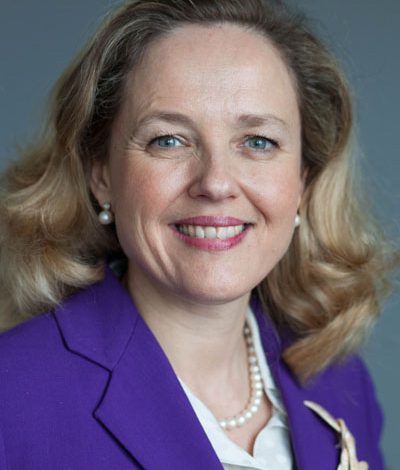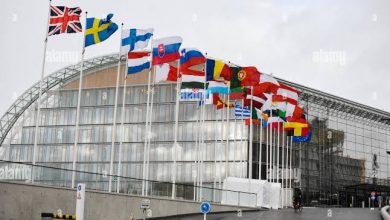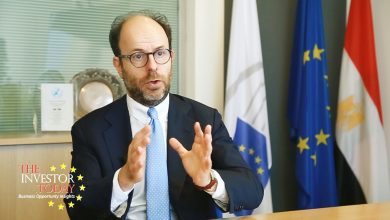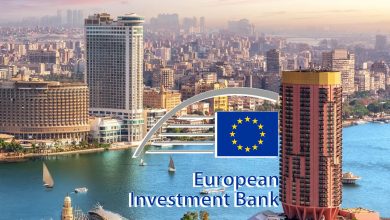Nadia María Calviño Santamaría: Leading the European Investment Bank Towards Sustainable Growth

Nadia María Calviño Santamaría (Spanish pronunciation: [ˈnaðja kalˈβiɲo]; born 3 October 1968) is a distinguished Spanish economist and civil servant who has been serving as the President of the European Investment Bank (EIB) since January 2024. Her extensive career, characterized by significant roles in both national and European institutions, underscores her expertise and dedication to economic and financial stability. From June 2018 to December 2023, Calviño was a key figure in the cabinets led by Prime Minister Pedro Sánchez, holding the office of Minister of Economy. Her tenure saw the portfolio renamed three times, reflecting the evolving economic priorities of Spain: Economy and Business (2018-2020), Economic Affairs and Digital Transformation (2020-2023), and finally, Economy, Trade, and Business. Additionally, from 2020 she served as Deputy Prime Minister of Spain, advancing from Third to First Deputy Prime Minister by July 2021.
Early Life and Education
Born in A Coruña, Galicia, Spain, on 3 October 1968, Nadia Calviño comes from a family with a strong background in public service. Her father, José María Calviño, was a former director general of the Radio Televisión Española (RTVE). Nadia Calviño pursued her academic interests rigorously, earning a degree in economics from the Complutense University of Madrid in 1991 and a law degree from the National University of Distance Education (UNED) in 2001. Her dual qualifications in economics and law laid a solid foundation for her future career in economic policy and public administration.
Career Beginnings
Calviño is a member of the Senior Corps of State Economists and Trade Advisors. Her early career in the Spanish Ministry of Economy saw her serve in various capacities, including as the general director of the National Competition Commission. Her significant contributions and leadership abilities soon paved the way for her move to the European Commission in 2006.
European Commission Tenure
At the European Commission, Calviño held several high-ranking positions. She served as Deputy Director-General attached to the Directorate-General for Competition (DG COMP) and subsequently as Deputy Director-General in the Directorate-General for Internal Market, Industry, Entrepreneurship and SMEs (DG MARKT), as well as in the Directorate-General for Financial Stability, Financial Services and Capital Markets Union. Her impressive trajectory continued when she was appointed Director-General for Budget (DG BUDG) in 2014, under the leadership of European Commissioner Günther Oettinger. This role further honed her skills in budgetary oversight and financial governance, setting the stage for her later appointments.
Minister of Economy of Spain
In June 2018, Prime Minister Pedro Sánchez selected Calviño to join his new government as Minister of Economy and Business. Her appointment followed the successful motion of censure against the previous government led by Mariano Rajoy. Calviño took office on 7 June 2018, marking the beginning of a transformative period in Spanish economic policy. During her tenure, she was a candidate for the position of Managing Director of the International Monetary Fund (IMF) in 2019, though she ultimately withdrew in favor of Kristalina Georgieva.
Deputy Prime Minister
Calviño’s prominence in the Spanish government grew as she was appointed Third Deputy Prime Minister and Minister of Economic Affairs and Digital Transformation in January 2020. She played a critical role in managing Spain’s economic response to the COVID-19 pandemic, announcing a €200 billion package to support the economy. Her pragmatic approach included advocating for the use of the European Stability Mechanism and proposing a substantial €1.5 trillion recovery fund for Europe.
In March 2021, she was promoted to Second Deputy Prime Minister and, by July 2021, she ascended to First Deputy Prime Minister. Her expanded portfolio included overseeing new technologies and digital transformation, reflecting the increasing importance of digital economy policies.
European Investment Bank Presidency
In August 2023, the Spanish government nominated Calviño to succeed Werner Hoyer as President of the European Investment Bank (EIB). With support from key European governments, her candidacy was confirmed by the Economic and Financial Affairs Council in early December 2023. As President of the EIB, Calviño is poised to leverage her extensive experience to advance the bank’s mission of promoting sustainable development and economic resilience.
Vision for the European Investment Bank
Nadia Calviño’s leadership at the EIB is expected to focus on several key areas:
- Sustainable Development: Emphasizing the EIB’s role as the “climate bank,” she aims to fund projects that reduce greenhouse gas emissions, support renewable energy, and enhance climate resilience.
- Investment in Green Technologies: Calviño advocates for strategic investments in innovative technologies, such as circular battery production and electric vehicles, to boost Europe’s competitiveness and sustainability.
- Digital Transformation: Building on her experience in the Spanish government, she is likely to prioritize digital infrastructure and technological innovation.
- Economic Recovery and Stability: Her tenure will likely see continued efforts to support economic recovery post-COVID-19, with a focus on resilient and sustainable growth.
- International Cooperation: Strengthening partnerships with other financial institutions and countries to support global development goals, including infrastructure projects in regions like Ukraine.
Conclusion
Nadia María Calviño Santamaría’s journey from a young economist in Galicia to the President of the European Investment Bank is a testament to her dedication, expertise, and leadership. Her extensive career in economic policy, both in Spain and at the European level, has equipped her with the skills and vision needed to steer the EIB towards a sustainable and resilient future. Under her leadership, the EIB is set to play a pivotal role in addressing some of the most pressing challenges of our time, from climate change to digital transformation. Calviño’s commitment to sustainable development and economic resilience will undoubtedly shape the EIB’s strategic direction in the years to come.



